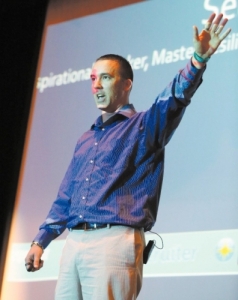Finding a less permanent solution
By Melinda Harrell
Published in News on October 1, 2017 1:45 AM

News-Argus/CASEY MOZINGO
Keynote speaker, master resilience trainer Sean Douglas asks the crowd a series of questions as he begins his speech "A Life Worth Living" Thursday night.

News-Argus/CASEY MOZINGO
The crowd participates in a resiliency activity lead by speaker Sean Douglas Thursday night at Wayne Community College during a suicide prevention presentation sponsored by Wayne UNC Health Care and Eastpointe.
On Christmas Eve in 2008, Sean Douglas said he was ready to die.
His wife left him and took the children. He was going to be kicked out of the military. He only had 14 cents in the bank.
Douglas put a gun in his mouth - he clutched a bottle of Jack Daniel's, the root of much of his sorrow and hopelessness - and he was ready to pull the trigger.
He said he was done.
Until the phone rang.
"I am just done," Douglas said in a defeated whisper during the A Life Worth Living suicide prevention event hosted by Wayne UNC Health at Wayne Community College Thursday.
"As I put the gun in my mouth, I got a phone call. The person who called me was my dad. He and I don't talk. We just don't."
Douglas said he and his father have strong disagreements and go long stretches of time before speaking to one another. He said it was peculiar that he would get a call from him.
"So I answer, 'Hey son, I was thinking about you just now and wanted to see how you were doing,'" Douglas said.
In that moment, Douglas told his father how he had lost everything and how he believed he was a failure and didn't want to live anymore.
In response, Douglass' father told him to call him back in two days from the chaplain's office. When he did, Douglas' father told him that he too wanted to kill himself long ago. And it was that pivotal moment of empathy that turned around Douglas' decision and the trajectory of his life.
He said he was raised in an abusive environment full of drugs and alcohol. He told the crowd in Moffatt Auditorium that he lived in 11 different houses and went to eight different schools by the time he was 18.
"It was what I knew," he said. A poor student with little prospects, he said he joined the Air Force.
He was stationed in England where he developed friendships with the people he was deployed with, which entailed heavy drinking, he said.
When he returned to the states, he kept on drinking. Then one day he was cited for being drunk and reporting for duty.
The spiral didn't stop there, however. In 2007, his house burned down during a party and he was too drunk to do anything, he said.
"My friends were nowhere to be found in the ashes that were in my driveway," he said.
After a stint in an alcohol dependency class, he thought his life would turn around, he said, but he was mistaken.
The drinking and partying became too much for his wife, so she left. He drank so much he couldn't pay rent and ended up spending four days in his car.
And at the end of 2008, he was ready to quit, but his story doesn't end with suicide, he said.
Now, active military stationed at Seymour Johnson Air Force Base, he is a popular speaker at high schools, colleges and military installations where he encourages people to develop skills and coping tools to prevent them from seeking death.
Douglas got help from his father and from the chaplain, but for some who suffer from despondency, depression and hopelessness, they may not know there is help out there, said Regina Gurley, who recently joined the medical staff at Wayne UNC Health.
She said that in nearly two-thirds of all suicides, the person did not see any health care provider within the year of their death.
"We have a nationwide shortage of mental health providers," she said.
"That is not only true in eastern North Carolina, but it is also true in the county of Wayne. This training is not difficult because it requires you to care about people."
Gurley highlighted some of the warning signs of suicidal behavior. Those signs, she said, were acting recklessly, isolation, getting too little or too much sleep, mood changes and a person saying goodbye.
She said if a person suspects that another is suicidal, they should talk to them by asking if they have thoughts of suicide and express the concerns about their observations.
It is important to listen to them, attentively and non-judgmentally, reflect on what they are saying and make sure that they know they are not alone and there is help, she said.
She also said that, according to data, women are more likely to attempt suicide while men are more likely to succeed, young adults are more likely to attempt suicide, while elderly white men over the age of 80 have the highest rate of suicide in the United States.
In light of these statistics she said, "Maybe, we should forgo any conception of who is likely to commit suicide because it affects all types of people."
Gurley said people can call Lifeline USA, a suicide prevention hotline, at 1-800-273-8255 if they want to talk or text SIGNS to 741741.
